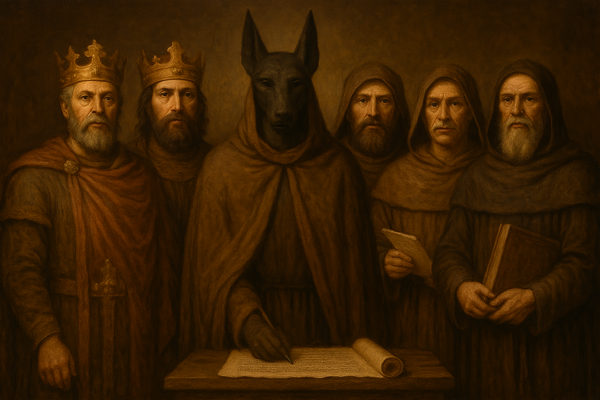Charismatic Cheetah Podcast - Analysis of Nephilim in Ancient Texts
These notes explore the biblical and extra-biblical foundations of the Nephilim, examining their origins, nature, and cultural significance within ancient texts.

What follows are the notes I used for the Charismatic Cheetah Podcast.
The goal of this episode was to explore the "ancient word on the street" to see how ancient Jews thought and wrote about the Nephilim. Here's your sneak peek at what we discussed.
The ancient perspective on the Nephilim
These notes explore the biblical and extra-biblical foundations of the Nephilim, examining their origins, nature, and cultural significance within ancient texts. Beginning with the Nephilim’s appearance in Genesis 6, these notes delve into their associated role in evil, tracing their impact through various texts like 1 Enoch, 3 Maccabees, 2 Peter, and Jude. The Nephilim are depicted as monstrous, hybrid beings born of the "sons of God" and human women, often connected with the corruption of the earth, the teaching of forbidden knowledge, and widespread violence. These notes also investigate the Nephilim's integration with ancient mythologies, particularly Greek and Jewish traditions, highlighting their conceptual similarities with giants and titans in these cultures. Further, I explore their physical diversity and monstrous characteristics, drawing on sources like 1 Enoch, Josephus, and Scripture itself to illustrate the broad range of attributes ascribed to these beings. The Nephilim’s eventual transformation into evil spirits is examined through their posthumous existence in Jewish literature and the Bible, including the binding of spirits and their role in leading humanity astray. Through this brief analysis, these notes underscore the Nephilim’s multifaceted role in ancient religious and mythological narratives, illustrating their enduring influence in both biblical texts and later traditions.
The foundation in Scripture
Introduction Overview:
- Nephilim in the Old Testament
- Genesis 6 (Their origins)
- Genesis 10 (Their return)
- Numbers 13:28-33 (Anakim=Nephilim)
- Deuteronomy 2:10-11 (Emim=Giants=Anakim=Rephaim)
- Deuteronomy 2:20-21 (Rephaim=Zamzummim=Giants=Anakim)
- Genesis 14 (Giant war)
- Genesis 15 (God waiting on the Amorites)
Nephilim are associated with deep evil
Genesis 6:1–7
When man began to multiply on the face of the land and daughters were born to them, 2 the sons of God saw that the daughters of man were attractive. And they took as their wives any they chose. 3 Then the LORD said, “My Spirit shall not abide in man forever, for he is flesh: his days shall be 120 years.” 4 The Nephilim were on the earth in those days, and also afterward, when the sons of God came in to the daughters of man and they bore children to them. These were the mighty men who were of old, the men of renown. 5 The LORD saw that the wickedness of man was great in the earth, and that every intention of the thoughts of his heart was only evil continually. 6 And the LORD regretted that he had made man on the earth, and it grieved him to his heart.
It is no coincidence that the sentence immediately following the description of the Nephilim describes humanity’s wickedness reaching an all-time high.
1 Enoch 7
These and all the others with them took for themselves wives from among them such as they chose. And they began to go in to them, and to defile themselves through them, and to teach them sorcery and charms, and to reveal to them the cutting of roots and plants. And they conceived from them and bore to them great giants…And the giants began to kill men and to devour them. And they began to sin against the birds and beasts and creeping things and the fish, and to devour one another’s flesh. And they drank the blood. Then the earth brought accusation against the lawless ones.
The watchers brought with them not only their horrible children but also witchcraft. Their children soon began to consume everything, drinking the blood of the innocent.
2 Peter 2:4-6
For if God did not spare angels when they sinned, but cast them into hell and committed them to chains of gloomy darkness to be kept until the judgment; if he did not spare the ancient world, but preserved Noah, a herald of righteousness, with seven others, when he brought a flood upon the world of the ungodly; if by turning the cities of Sodom and Gomorrah to ashes he condemned them to extinction, making them an example of what is going to happen to the ungodly;
The context of this passage in 2nd Peter is the topic of sexual immorality, and in this context, Peter uses the judgment of the angels who sinned and the judgment of Sodom and Gomorrah as examples of God's judgment on those who commit horrific sexual sin. Notice the poetic contrast between destruction by water and destruction by fire that burns the cities to ashes, just like the passage in Luke.
Jude 1:6-7
And the angels who did not stay within their own position of authority, but left their proper dwelling, he has kept in eternal chains under gloomy darkness until the judgment of the great day— just as Sodom and Gomorrah and the surrounding cities, which likewise indulged in sexual immorality and pursued unnatural desire, serve as an example by undergoing a punishment of eternal fire.
If these narratives are truly linked conceptually in the minds of the ancient Jews, we should expect to see this literary approach in extra biblical sources as well. Of course, this is in fact the case. 3 Maccabees compares and contrasts the judgement the antediluvian world with Sodom just as Jude and Peter do.
3 Maccabees 2:4-5
You destroyed those who in the past committed injustice, among whom were even giants who trusted in their strength and boldness, whom you destroyed by bringing upon them a boundless flood. 5 You consumed with fire and sulphur the men of Sodom who acted arrogantly, who were notorious for their vices; and you made them an example to those who should come afterward.
The similarities between this passage and those of Peter and Jude are obvious, but they too aren't alone. I'll give one more example from Jewish literature.
The Wisdom of Sirach 16:7-11
He was not propitiated for the ancient giants who revolted in their might.
He did not spare the neighbors of Lot, whom he loathed on account of their insolence.
He showed no pity for a nation devoted to destruction, for those destroyed in their sins;
Nephilim were associated with Pagan mythologies
- Genesis 6 (men of renowned)
- Josephus 1.3.1 Greek myths
- Peter using the word Tartarus
- Septuagint using the word Titans
Genesis 6:4
…These were the mighty men who were of old, the men of renown.
Antiquities of the Jews by Josephus 1.3.1
For many angels of God accompanied with women, and begat sons that proved unjust, and despisers of all that was good, on account of the confidence they had in their own strength; for the tradition is, that these men did what resembled the acts of those whom the Grecians call giants.
2 Peter 2:4
For if God did not spare angels when they sinned, but cast them into hell and committed them to chains of gloomy darkness to be kept until the judgment;
The word for hell is actually the Greek verb that specifically means “to be cast into Tartarus”. Tartarus is a realm underneath hades in Greek mythology where the titans were locked up by Zeus. This is the only time this word is used in the Bible. Peter knew the normal terminology for hell, but he specifically used this verb. While we may never know his reasons, scholars fully recognize it’s implications. The Greek myths were not entirely false. Tartarus was real, the infamous dungeon for the titans. As it happens, the Greek word for titans was actually used in the Septuagint when translating the Hebrew word Rephaim.
The Lexham Bible Dictionary, Rephaim
The Septuagint’s translation diversity is evidenced in how it treats “Valley of the Rephaim.” The term repha’im is rendered with Ραφαϊμ (Raphaim) (2 Sam 23:13); τιτάνων (titanōn, “Titans”; 2 Sam 5:18); and γιγάντων (gigantōn, “Giants”; 1 Chr 11:15; 14:9).
The Lexham Bible Dictionary, Rephaim
The Septuagint’s use of titanon (“Titans”; lemma: τιτάν, titan) for repha’im creates a conceptual link between the biblical Rephaim and Greek mythology. The Titans were, depending on the Greek writer and text, divine beings or the giant offspring of divine beings (Heiser, “Giants”). On two occasions (2 Sam 5:18, 22), the Masoretic phrase עֵמֶק רְפָאִים (emeq repha'im, “valley of the Rephaim”) is rendered κοιλάδα τιτάνων (koilada titanōn, “Valley of the Titans”). As Doak notes: “… [T]he very references to the Giants and Titans already suggest a world which is in some way comparable to Greek myth … [T]he effect of the introduction of Greek mythological vocabulary in suggestive and enigmatic places can only, in effect, serve to make the Greek Giants and Titans part of the biblical story” (Doak, Last of the Rephaim, 58).
In summary, Genesis 6:4 clearly assumes an understood context. According to Josephus, the Septuagint, and the implications of Peter’s very specific word choice, the Nephilim and Rephaim were thought to be directly related to the giants of Greek, and possibly other, mythologies.
Nephilim were physically diverse
1 Enoch 7:2
And they conceived from them and bore to them great giants. And the giants begot Nephilim, and to the Nephilim were born †Elioud†. And they were growing in accordance with their greatness.
1 Enoch describes 3 races being born, the Nephilim being one of them. Comparing this to the Rephaim and how they both seem to be used interchangeably with other tribes, it seems as though the Nephilim mentioned in Genesis 6 might be a catch all term that referenced the 3 that 1 Enoch specifies.
Similarly, but with different names, the book of Jubiliees tells the same story.
Jubilees 7:21-25 (supposedly quoting Noah speaking to his sons)
21 For owing to these three things came the flood upon the earth, namely, owing to the fornication wherein the Watchers against the law of their ordinances went a whoring after the daughters of men, and took themselves wives of all which they chose: and they made the beginning of uncleanness.
22 And they begat sons the Naphidim, and they were all unlike, and they devoured one another: and the Giants slew the Naphil, and the Naphil slew the Eljo, and the Eljo mankind, and one man another.
23 And every one sold himself to work iniquity and to shed much blood, and the earth was filled with iniquity.
24 And after this they sinned against the beasts and birds, and all that moves and walks on the earth: and much blood was shed on the earth, and every imagination and desire of men imagined vanity and evil continually.
25 And the Lord destroyed everything from off the face of the earth; because of the wickedness of their deeds, and because of the blood which they had shed in the midst of the earth He destroyed everything.
Jubilees 7:22 says "they were all unlike." This begs the question: unlike how? Could this be referring to the difference in power and greatness? Contextually it doesn't seem to. It's inserted between the statement that they were born of the watchers and that they killed each other, like a random side note. To know what this variation of likeness means we must turn to other texts.
Antiquities of the Jews by Josephus 5.2.3
There were till then left the race of giants, who had bodies so large, and countenances so entirely different from other men, that they were surprising to the sight, and terrible to the hearing.
Josephus tells us that they looked entirely different from mankind.
He also mentions they are "terrible to the hearing." This brings to mind the Zamzummim (Deuteronomy 2:20) whos name means "a tribe making a noise"
But just how different are these beings? Could this not simply mean that they were big?
The book of giants goes as far as to say that some of them were considered giants and some monsters.
The Book of Giants - 4Q531 Frag. 2
[...]they defiled[...][...they begot]giants and monsters[...][...]they begot, and, behold all [the earth was corrupted...][...]with its blood and by the hand of[...]giant's which did not satisfy them and[...][...]and they were seeking to devour many[...][...][...]the monsters attacked it.

Nephilim became evil spirits
Deuteronomy 32:17
They sacrificed to demons who were not God, To gods whom they have not known, New gods who came lately, Whom your fathers did not dread.
Psalm 106:37
They even sacrificed their sons and their daughters to the demons,
It's worth pointing out that the old testament never strictly uses the word demons because that is an English word that comes a Greek word. Dueteronomy 32 and Psalm 106 use the word Shedim (shades) and the English translators, understanding the concept, translated that as "demons".

Deuteronomy 3:11
(For only Og king of Bashan was left of the remnant of the Rephaim. Behold, his bedstead was an iron bedstead; it is in Rabbah of the sons of Ammon. Its length was nine cubits and its width four cubits by ordinary cubit.)
This concept of leadership, or kingship, and the giants was closely connected, which brings us to Isaiah 14:9. Here we again see the word Rephaim used to describe the "spirits of the dead" (whom the Rephaim now are by this point in the Biblical narrative).
Isaiah 14:9
Sheol from beneath is excited over you to meet you when you come;
It arouses for you the spirits of the dead, all the leaders of the earth;
It raises all the kings of the nations from their thrones.
1 Enoch 15:8-10
Now the giants, who have been born of spirit and of flesh, shall be called upon earth evil spirits, and on earth shall be their habitation. Evil spirits shall proceed from their flesh, because they were created from above; from the holy Watchers was their beginning and primary foundation. Evil spirits shall they be upon earth, and the spirits of the wicked shall they be called. The habitation of the spirits of heaven shall be in heaven; but upon earth shall be the habitation of terrestrial spirits, who are born on earth.
The spirits of the giants shall be like clouds, which shall oppress, corrupt, fall, contend, and bruise upon earth.
They shall cause lamentation. No food shall they eat; and they shall be thirsty; they shall be concealed, and shall not rise up against the sons of men, and against women; for they come forth during the days of slaughter and destruction.
Enoch, which the Bible itself quotes at times, says in no uncertain terms that demons are the spirits of the dead giants.
Jubiliees 10:2-9
And the sons of Noah came to Noah their father, and they told him concerning the demons which were leading astray and blinding and slaying his sons' sons.
And he prayed before the Lord his God, and said:
'God of the spirits of all flesh, who hast shown mercy unto me
And hast saved me and my sons from the waters of the flood,
And hast not caused me to perish as Thou didst the sons of perdition;
For Thy grace has been great towards me,
And great has been Thy mercy to my soul;
Let Thy grace be lift up upon my sons,
And let not wicked spirits rule over them
Lest they should destroy them from the earth.
But do Thou bless me and my sons, that we may increase and Multiply and replenish the earth.
And Thou knowest how Thy Watchers, the fathers of these spirits, acted in my day: and as for these spirits which are living, imprison them and hold them fast in the place of condemnation, and let them not bring destruction on the sons of thy servant, my God; for these are malignant, and created in order to destroy.
And let them not rule over the spirits of the living; for Thou alone canst exercise dominion over them. And let them not have power over the sons of the righteous from henceforth and for evermore.'
And the Lord our God bade us to bind all.
And the chief of the spirits, Mastêmâ, came and said: 'Lord, Creator, let some of them remain before me, and let them harken to my voice, and do all that I shall say unto them; for if some of them are not left to me, I shall not be able to execute the power of my will on the sons of men; for these are for corruption and leading astray before my judgment, for great is the wickedness of the sons of men.'
And He said: Let the tenth part of them remain before him, and let nine parts descend into the place of condemnation.'
NOTE: It says that the Nephilim were “created in order to destroy”

Works Cited
- Barry, John D., et al., eds. The Lexham Bible Dictionary. Lexham Press, 2016. Michael S. Heiser, “Rephaim,” https://ref.ly/res/LLS:LBD/2023-08-04T19:52:23Z/21503159?len=255.
- 3 Maccabees. https://pseudepigrapha.com/apocrypha_ot/3macc.htm.
- 1 Enoch: The Hermeneia Translation. Translated by George W. E. Nickelsburg and James C. VanderKam. Fortress Press, 2012. https://ref.ly/res/LLS:HRMNEIA1ENOCH/2021-08-17T01:24:45Z/84481?len=102.
- Antiquities of the Jews. Translated by William Whiston. https://pseudepigrapha.com/josephus/index.html.
- Charles, R.H., trans. Jubilees. Oxford, Clarendon Press, 1913. https://pseudepigrapha.com/jubilees/index.htm.
- The Wisdom of Sirach. https://pseudepigrapha.com/apocrypha_ot/sirac.htm.
- Lumpkin, Joseph. The Book of Giants: The Watchers, Nephilim, and The Book of Enoch. Paperback, November 12, 2014. https://a.co/d/2fz6Cvg







